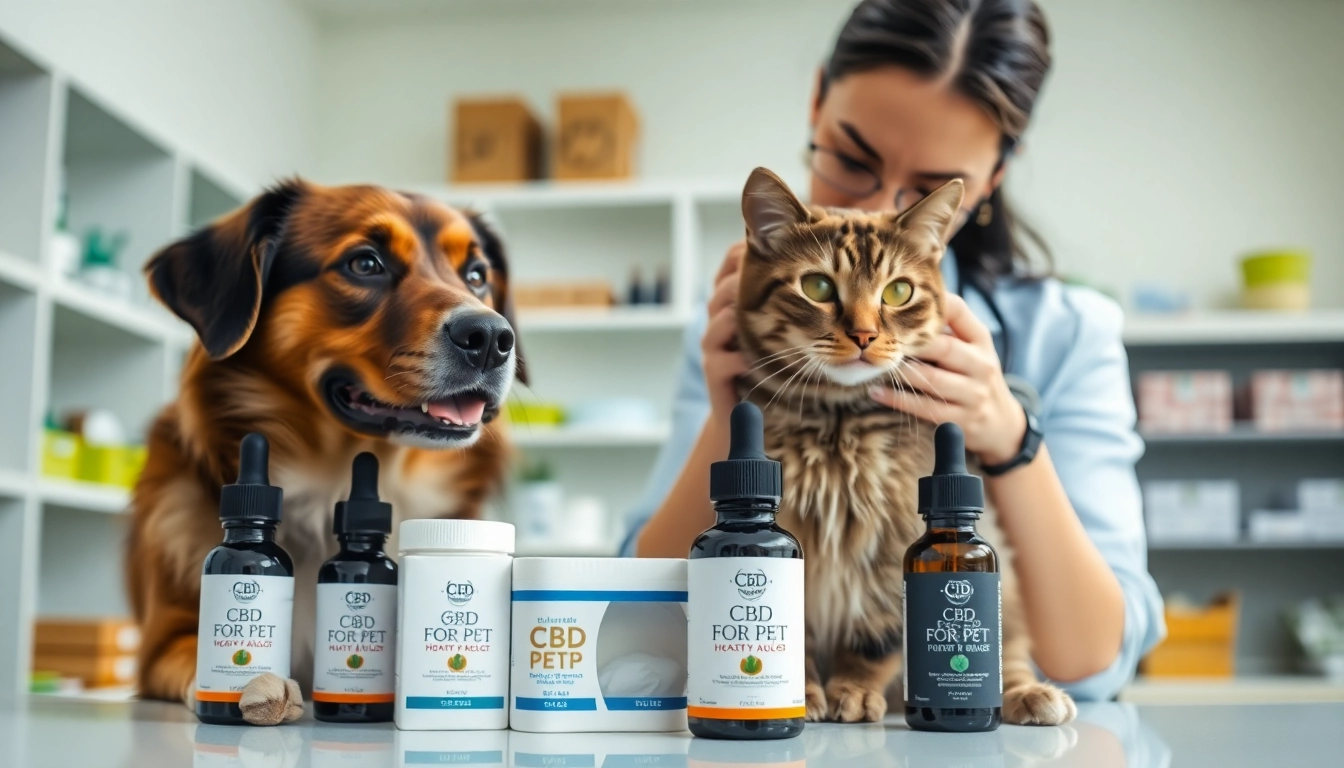Understanding CBD For Pets: What Pet Owners Need to Know
CBD, or cannabidiol, has garnered a wealth of attention in recent years for its potential therapeutic benefits—not just for humans but also for our beloved pets. As wellness trends continue to evolve, many pet owners are exploring the use of CBD For Pets as a natural remedy for various health concerns. However, there exists a significant gap in understanding regarding the nature of CBD, its mechanisms of action, and the implications it holds for our furry companions. This article seeks to clarify these aspects, dispel myths, and provide thorough guidance on incorporating CBD into your pet’s care routine.
1. What is CBD and How Does it Work for Pets?
CBD is one of over a hundred cannabinoids found in the cannabis plant. Unlike THC (tetrahydrocannabinol), the psychoactive component that causes the “high,” CBD does not produce intoxicating effects. Instead, it works by interacting with the endocannabinoid system (ECS), a complex cell-signaling system present in all mammals, including dogs and cats.
The ECS plays a pivotal role in regulating various physiological functions such as mood, pain sensation, appetite, and sleep. CBD influences this system by mimicking naturally occurring endocannabinoids, thereby helping to restore balance and promote homeostasis within the body. This action can lead to improvements in conditions like anxiety, pain management, and overall well-being in pets.
Research into CBD’s efficacy for pets is still in its infancy, but early studies and anecdotal evidence suggest promising results. For instance, a 2018 study published in the *Journal of the American Veterinary Medical Association* indicated that CBD oil significantly reduced pain and increased activity in arthritic dogs.
2. The Differences Between CBD and THC
It’s essential for pet owners to distinguish between CBD and THC, given their differing effects and regulatory status. While both are cannabinoids derived from the cannabis plant, THC is the psychoactive compound that produces a “high.” In contrast, CBD is primarily associated with therapeutic effects without the psychoactive consequences.
For pets, THC can be harmful, leading to symptoms like lethargy, vomiting, loss of coordination, and in severe cases, it may even be fatal. Most commercially available CBD products for pets utilize industrial hemp, which contains less than 0.3% THC, thus ensuring a safe profile for animal consumption.
Understanding these differences enables pet owners to make informed choices regarding treatment options for their pets, ensuring they select suitable products that are safe and effective.
3. Common Misconceptions About CBD For Pets
Despite the growing popularity of CBD for pets, several misconceptions cloud its use:
– Myth 1: CBD Will Get My Pet High: As emphasized earlier, quality CBD products for pets contain negligible amounts of THC, meaning they will not induce any psychoactive effects.
– Myth 2: All CBD Products Are the Same: Not all CBD products are created equal. The source of CBD, extraction method, and product formulation can vary significantly. It’s vital to choose products specifically designed for pets to ensure safety and efficacy.
– Myth 3: CBD Is a Cure-All: While CBD can aid various conditions, it’s not a substitute for comprehensive veterinary care. Behavioral issues, chronic pain, or any severe health concern should be approached in collaboration with a veterinarian.
Addressing and debunking these misconceptions fosters a healthier conversation around the responsible use of CBD in pet care, encouraging evidence-based practices.
Benefits of CBD For Pets: Enhancing Your Pet’s Quality of Life
With a deeper understanding of CBD and its interaction with pets, we turn our attention to the benefits it may offer. From alleviating anxiety to managing chronic pain, CBD has the potential to significantly enhance the quality of life for our beloved companions.
1. Alleviating Anxiety in Pets
Pets, much like humans, can experience anxiety due to various triggers—be it separation anxiety when left alone, fear of loud noises, or even reactions to changes in their environment. Research suggests that CBD may help in managing these anxious feelings by promoting a sense of calm without sedation.
A study published in the *Frontiers in Veterinary Science* found that dogs treated with CBD oil showed a significant reduction in anxiety-related behaviors. CBD is believed to impact serotonin levels in the brain, which helps stabilize mood and promote feelings of well-being.
For pet owners seeking to alleviate anxiety in their pets, administering CBD can serve as an effective adjunct to behavioral modification techniques, fostering a holistic approach to emotional health.
2. Managing Pain and Inflammation
Chronic pain and inflammation are particularly common in aging pets or those suffering from conditions like arthritis, which can greatly diminish their quality of life. The anti-inflammatory properties of CBD come into play here, potentially providing relief from painful symptoms.
Research indicates that CBD can reduce chronic pain by altering pain perception pathways in the brain. Many pet owners have observed improvements in mobility and reduction in pain levels after introducing CBD into their pets’ routines.
Before starting your pet on a CBD regimen, however, a consultation with a veterinarian is essential to determine the underlying cause of pain and ensure a comprehensive management plan tailored to your pet’s unique needs.
3. Supporting Overall Health and Well-Being
Beyond anxiety relief and pain management, CBD may support various aspects of overall health in pets. Pet owners often report improvements in appetite, digestion, and sleep patterns. Given that CBD may enhance the functional capacity of the ECS, these benefits compound to support holistic well-being.
Furthermore, CBD’s antioxidant properties may help combat age-related ailments and promote longevity. With its ability to support immune function and reduce stress-related responses, CBD can empower pet owners to take proactive steps toward their pets’ health, ensuring a vibrant and happy life.
Choosing the Right CBD For Pets Products: A Guide for Pet Owners
As the market for pet CBD products expands, pet owners face the challenge of navigating various options. Understanding how to choose the right CBD products ensures that the therapeutic potential of CBD is realized safely and effectively.
1. Factors to Consider When Selecting CBD Products
When exploring CBD options for pets, consider the following factors:
– Source of Hemp: Opt for products derived from organically grown hemp to avoid pesticides, heavy metals, and harmful chemicals.
– Extraction Method: CO2 extraction methods are considered the safest and most efficient, yielding pure CBD without unnecessary additives.
– Full-Spectrum vs. Isolate: Full-spectrum products contain a range of cannabinoids and terpenes, potentially enhancing the therapeutic effect through the entourage effect. CBD isolates contain pure CBD without other cannabis compounds. Choose based on your pet’s needs and preferences.
– Transparency and Testing: Look for brands that provide third-party lab testing results. This ensures the product’s purity and potency, validating the claims made by the manufacturer.
2. Reading Labels: What to Look For
Understanding product labels is crucial in making informed decisions. Here are some aspects to scrutinize:
– CBD Content: Check the amount of CBD per serving to gauge whether it meets your pet’s needs based on weight and condition.
– Additional Ingredients: Be cautious of products that contain additives, preservatives, or flavorings that may not be suitable for your pet. Whole food ingredients are always preferred.
– Dosage Instructions: Ensure the label provides clear dosage guidelines for different sizes and species of pets.
A thorough assessment of product labels can save time and potential health concerns for your pet, guiding you toward high-quality CBD options.
3. Understanding Dosage and Administration
CBD dosage for pets can vary based on factors such as weight, age, and the intended use. While some products provide a recommended dosage chart, a good rule of thumb is to start with a low dose (typically 0.1-0.2 mg of CBD per kilogram of body weight) and gradually increase as needed, observing your pet’s response.
Administering CBD may come with challenges — some pets may be hesitant to consume it directly. To facilitate easier administration, consider:
– CBD Treats: Many brands offer CBD-infused treats, which may make the process more appealing and palatable.
– Tinctures: CBD oils or tinctures can be mixed into your pet’s food or placed directly in their mouths using a dropper.
– Capsules: For pets that accept pills, capsules may be a good alternative.
Monitor your pet for any adverse reactions or changes in behavior following the administration of CBD, as individual responses can vary, highlighting the importance of personalized care.
Real-Life Success Stories: CBD For Pets Transforming Lives
To illustrate the tangible benefits of CBD, let’s explore some real-life success stories that showcase the positive impact that CBD products have had on pets and their owners.
1. Testimonials from Happy Pet Owners
Many pet owners have taken to online platforms to share testimonials about their pet’s remarkable transformations after using CBD. For instance, a dog owner named Sara reported massive improvements in her Labrador’s anxiety, particularly during thunderstorms. Sara noted that after introducing CBD into her pet’s routine, her dog was much calmer, allowing them to enjoy the rain without excessive barking or hiding.
Another cat owner shared a touching story about their senior feline who was struggling with arthritis. Post-CBD treatment, the cat became more active and playful, returning to behaviors reminiscent of its younger years. These personal accounts underscore the potential therapeutic benefits and transformative changes that CBD can bring to our pets’ lives.
2. Case Studies of Pets Benefiting from CBD
Case studies conducted by veterinarians reveal compelling evidence of CBD’s role in pet therapy. In several instances, dogs diagnosed with cancer received CBD as part of their treatment plan. Results indicated improved appetite, reduced pain levels, and enhanced energy that enriched their final months.
Additionally, a pup experiencing substantial discomfort due to hip dysplasia saw remarkable improvements in mobility after CBD was introduced to their regimen, allowing for a more active lifestyle.
Collectively, these case studies provide valuable insights into CBD’s efficacy, influencing other pet owners to consider its application in similar scenarios.
3. How CBD For Pets Has Changed Daily Routines
Pet owners have often reported that CBD has positively impacted their daily routines with their pets. With reduced anxiety and improved health, pets are more engaged and interactive, leading to more enjoyable outings, play sessions, and bonding moments.
Moreover, CBD has allowed pet owners to adopt a proactive approach to health, taking on daily routines with an emphasis on wellness enhancements. Pet parents are increasingly incorporating wellness checks, outings, and training into their routines, fostering better overall health and deeper connections with their pets.
These changes enrich the everyday interactions between pets and their owners, transforming the lives of both parties.
Future of CBD For Pets: Trends and Research
As more pet owners embrace CBD, the future of CBD for pets is destined for growth. Continued research and development will likely yield new insights into its efficacy, expanding its application within veterinary medicine.
1. Ongoing Research and Findings
Current research into the benefits of CBD for pets continues to flourish, with universities and veterinary institutions conducting studies to determine effective dosages, optimal formulations, and targeted conditions that respond well to treatment. Increased awareness and adoption of CBD for pets are leading to more rigorous scientific inquiry, paving the way for evidence-based practices.
Research addressing specific conditions like epilepsy, cancer, and anxiety in pets will provide additional clarity and validation for pet owners considering CBD as a therapeutic option.
2. Regulatory Landscape for CBD Products
As CBD gains momentum in the pet care industry, the regulatory framework surrounding its use is evolving. Various regions are implementing specific regulations regarding the sale and marketing of CBD products, balancing the need for consumer safety with the desire for accessible pet healthcare options.
Understanding the legal implications and regulatory status of CBD in your area is vital for pet owners. As the regulatory landscape continues to solidify, manufacturers will likely face stringent guidelines around product labeling, testing, and marketing claims.
3. The Future of CBD in the Pet Care Industry
The pet care industry is witnessing a paradigm shift with the increasing acceptance and integration of CBD into pet health regimens. The future may see the emergence of specialized veterinary practices dedicated to cannabinoid therapies or annual conferences focused solely on advancements in CBD research for pets.
As consumer demand for alternative treatments grows, we can anticipate the development of innovative products tailored specifically for pets, including topicals, food additives, and more precise formulations catering to individual health needs. The continuous exploration of CBD offers exciting prospects for enhancing proactive pet care.
Conclusion
CBD for pets represents a promising intersection of veterinary science and holistic treatment options. Educating yourself about the uses, benefits, and responsible applications of CBD can empower you as a pet owner to make informed choices that best suit your companion’s needs.
As research continues to unfold the therapeutic potential of CBD, more pet owners are likely to embrace it as a valuable addition to their pet care strategies—transforming anxiety into tranquility, pain into comfort, and enhancing the quality of life for pets everywhere.
By remaining informed and open to the possibilities that CBD presents, you contribute to a brighter and healthier future for your pet, one filled with love, joy, and companionship.












Leave a Reply